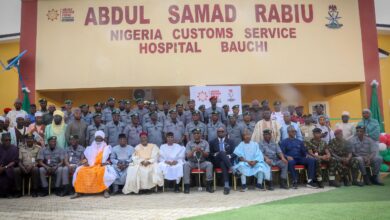‘Multinational Oil Companies Don’t Have Clean Bill Of Health To Divest From Nigeria’
...Tension Already Building Up In Bauchi, Gomber Over Oil Prospecting Activities

By Edu Abade
International Oil Companies (IOCs), some of which started operating in Nigeria for over 70 years, do not have a clean bill of health to divest (sell their onshore assets) and leave the country until they fix the disasters their exploration activities caused to the natural environment of oil producing communities in the Niger Delta and other oil-bearing states.
Although the likes of Shell, Eni, ExxonMobil, TotalEnergies, Chevron and Agip have not fully divested from the country, negotiations over divestment from onshore to offshore drilling of crude oil escalated in 2021 after Shell lost a court case instituted against it by impacted communities of Akwa Ibom and Rivers states with pressures from civil society groups.
Environmentalists and civil society organizations have also argued that even though the multinational oil companies have the right to sell their assets to interested local investors, they must clear the ecological mess they created in Ogoni land and other oil producing host communities of the Niger Delta, insisting: “Only then can they fully conclude their divestment plans.”
This was the verdict at a virtual meeting organised for environmental activists, community members and journalists by the Environmental Rights Action/Friends of the Earth Nigeria (ERA/FoEN) in collaboration with the Socio-Economic Research and Development Centre (SERDC) on Thursday, March 28, 2024.
In his presentation during the Webinar titled: Time for a Legislative Pathway on IOCs Divestment in the Niger Delta, Executive Director of ERA/FoEN, Barrister Chima Williams, explained that the virtual meeting was organized to interrogate the real reasons the multinationals were bent on leaving their onshore operations to offshore where they will continue their environmental crimes with less monitoring.
“They are not completely leaving Nigeria. They are only leaving their onshore assets to concentrate on offshore operations. The painful part is that they have succeeded in setting communities against themselves. They want to leave the issues of clashes and crises they created over the years between host communities and individuals.
“Divestment issues became popular in 2021 after ERA/FoEn won a case for communities against Shell. This is the main reason for divestment and that is why we are campaigning against selling their assets to local companies. We are against their ploy because they have destroyed our environment and are now moving offshore to start another level of devastation in our deep waters.
“We insist that they must right the wrongs done in the communities. ERA/FoEN has been with host communities of Akwa Ibom, Bayelsa, Delta, Rivers and other Niger Delta states for over 30 years and we can describe their situation as very devastating! Farmlands and means of livelihoods have been destroyed and our people can no longer engage in farming or fishing, which was their major preoccupation before oil exploration started,” he said.
Williams, who lamented that people are exposed to perpetual daytime due to gas flaring fire, said in such communities, the people are deprived of their right to darkness in which certain persons get inspiration and engage in deeper thinking that results in creativity, adding that the situation amounted to ‘colossal denial.’
On the selling of assets to indigenous oil firms, he argued that if the multinationals with all their financial war chest and technological knowhow could not handle the environment issues they created, how will local firms be able to handle such matters with lesser financial power and technology?
Citing the cases of the massive oil spill of Aiteo Oil Well in Bayelsa and Ororo fire incident, he cautioned indigenous firms to do their due diligence before buying the dilapidated assets from multinational oil companies, adding: “Except the right things are done, local firms buying such assets will be a huge disaster and Nigeria will be worse for it if this is allowed.”
Also speaking on a responsive divestment process, he noted that owners of assets have the right or liberty to sell, but they cannot divest without putting the right things in place and return the host communities to status quo ante for the years of deprivation they have suffered.
“The multinationals should pay the Federal Government what they owe after a recalculation of the total amounts. Gas flare penalties should be paid for as well,” he added.
Citing the cases of Oando Plc, Agip and ExxonMobil, he expressed delight that ERA/FoEN campaigns have yielded some positive outcomes in that the Federal Government had rejected some divestment proposals since 2021, adding that the law courts have also held that divestment in Ogoni land should wait until certain issues are resolved.
Williams, therefore, urged the National Assembly to start the process of legislation to ensure that the IOCs are held accountable, especially on matters that have to do with restoration of the Niger Delta environment and their planned divestments.
“We ask all Nigerians to demand legislation by the National Assembly that will ensure that the IOCs do the rights things before they are allowed to divest. We also seek the establishment of an Environmental Restoration Fund to tackle the issues of pollution before proposals for divestment are concluded,” he stressed.
On his part, Executive Director of SERDC, Tijani Abdulkareem, who said he was partnering with ERA/FoEN to raise awareness among communities in Bauchi and Gombe states where oil exploration activities have commenced, pointed out that tension has already started building up in the area.
He said the community people are largely ignorant about the impact of oil exploration in the Alkaleri area of Bauchi, which borders Gombe State, adding that oil workers were already promoting immorality among women in the communities due to the kind of money in their possession.
Reacting to the issue of crisis always associated with oil exploration activities, Abdulkareem said: “We foresee such conflicts in the North East, especially with escalating cases of banditry, terrorism, kidnapping and environmental impacts. Social impacts have already started manifesting in the communities.
“There is no way to avoid conflicts of the Niger Delta proportions in Bauchi and Gombe at the full commencement of oil exploration activities. It may even be worse in the North East than in the Niger Delta given the level of poverty, ignorance and security challenges in the region over the years,” he said.
Abdulkareem, however, expressed the hope that SERDC and civil groups in the region will continue to engage and create awareness in the communities on the realities of environmental degradation and actions to be taken to ensure that the people are protected, maintaining that civil society organizations and the media have a crucial role to play in holding the IOCs accountable for the impacts of their exploration activities.









